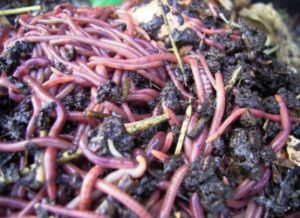Why Worm Poop Is An Organic Gardening Savior

Were you one of those inquisitive little children who innocently sawed writhing worms in half with a twig just to witness the regeneration process that you learned about in science class? Ouch. Hopefully now – in your adult life – you make a concerted effort to wield no wormy weapons, instead admiring from a distance their distinctively eco-beneficial handiwork.
On the other hand, if squirmy invertebrates give you the creeps in spite of your currently wizened age, would you at the very least consider their most outstanding attributes? Like the fact that they produce glorious poop? I know. It’s a weird concept. Organic gardeners practically do the dance of joy when explaining how the excrement of such slimy little suckers is capable of yielding the mother lode of all crop harvests, and yet they’re not nearly as nutty as they sound. (Some might argue that this green thumb strategy is downright sane compared to composting the human version…)
Oddly enough, a yard absolutely bursting at the seams with worms means that all is quite well beneath the roots of your veggie garden. As it turns out, the pink slimies fully enjoy basking in the glory of a popular social life, so if you discover that your soil to squirmy-wormy ratio is ridiculously ample, that means that they’re purposely hunkering down in a plot that is teeming with oodles of beneficial fungi and microorganisms. With more micro-peeps to commiserate with and chow down on, your worm population is going to soar, meaning that the poop will ultimately hit the fan (but in a good way).
Worm excrement — also known as ‘poop’, ‘vermicast’, ‘earthworm castings’, ‘casings’, ‘humus’ or ‘worm manure’ – is a good thing, indeed. Whatever nickname you favor, the stuff that your worm buddies expel amid your flower and veggie crops is bursting with easily soluble nutrients including naturally occurring nitrogen (transforming formerly blah top soil into shazaaam! as far down as 6 inches). This holy grail of garden goodness yields just the right growth-enhancing medium to make plants kick up their heels and sing.
Oh, but that’s not all. Worm castings offer an insurance policy against the emergence of plant diseases by inoculating your garden with a whole host of microbes that embrace the ‘You scratch my back and I’ll scratch yours’ philosophy. No matter what, everyone in that vast microcosm works in tandem to keep invaders at bay, ensuring that plant life ultimately reigns supreme.
So what should you do when beneficial critters from all corners of the earth seem to be purposely avoiding your garden like the plague? This three part plan of action should work like a charm:
SEDUCE THEM
Make your garden irresistible by augmenting your lackluster dirt with good and juicy home grown or store bought organic compost along with grass and even leaf mulch throughout your entire growing season. The more organic material you add, the merrier your worms will be. Once just a handful of worms catch wind of the free buffet going on in your backyard, they’ll tell two friends, two more will follow, and before you know it, your backyard will have a truly wonderful infestation.
Equally as important, lay off the chemicals, herbicides and pesticides once and for all! If you exterminate microbes lurking beneath your soil with chemical aids, guess what you’ll also be wiping out? The very wrigglers that you want lending you a helpful… er… slimy appendage. Stick with organic aids when at all possible!
TAKE MATTERS INTO YOUR OWN HANDS
You can certainly wait until the wormy word has spread throughout your ‘hood that your yard is worth setting up shop in, but if you lack the patience and desire more immediate gratification, you might want to take a short cut by purchasing your future invertebrate residents instead.
Red wigglers are available at local garden centers as well as online suppliers – just bear in mind that these critters are most ideally suited for life in the highly controlled environment of a vermicomposting bin rather than directly in your garden. Many green thumbs agree that when allowed to jump the container coop, red wigglers typically end up dying off or vacating the premises altogether unless you are vigilant about adding a consistent amount of organic matter to your garden. However, you can still have some success using this shortcut worming method by constructing vermicomposting trenches running parallel to your crops. Be advised that it will require a fair amount of digging to set the plan in motion, so it’s not exactly a quick fix.
BREW A CUPPA
Not for you to drink, but for your garden. And yes, this is a legitimate gardening technique. Basically, when mature worm poop is soaked in water along with a sugar-based ingredient like molasses (which feeds happy little microorganisms), the result of your gardening alchemy is a bubbly brewed liquid that is positively ripe with soluble nutrients. For the home gardener, this solution should be applied once a week using a handheld spraying apparatus in a ratio of one part straight-up worm poop tea to five parts water directly on plant roots. Of course you can buy it already made, but what’s the fun in that? Don’t you want to get down and wormy? No…not even just a little?!?
Image via jarsyl
For more juicy green goodness, follow Elizah via Twitter: @elizahleigh

